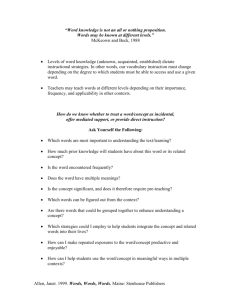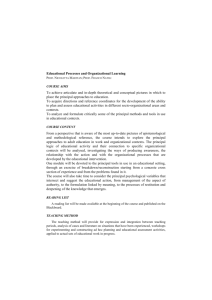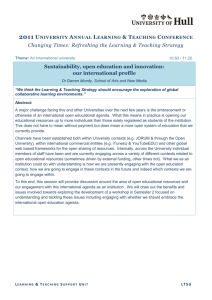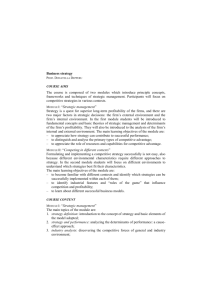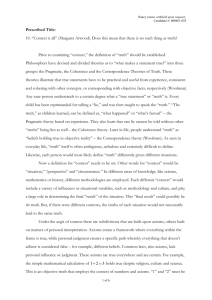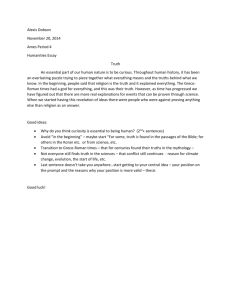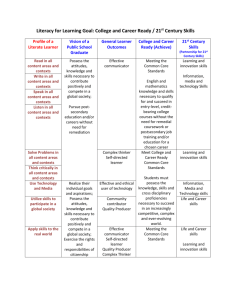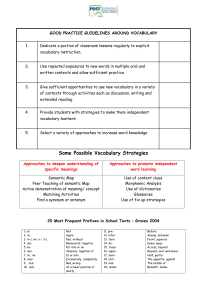Context is all (Margaret Atwood). Do
advertisement
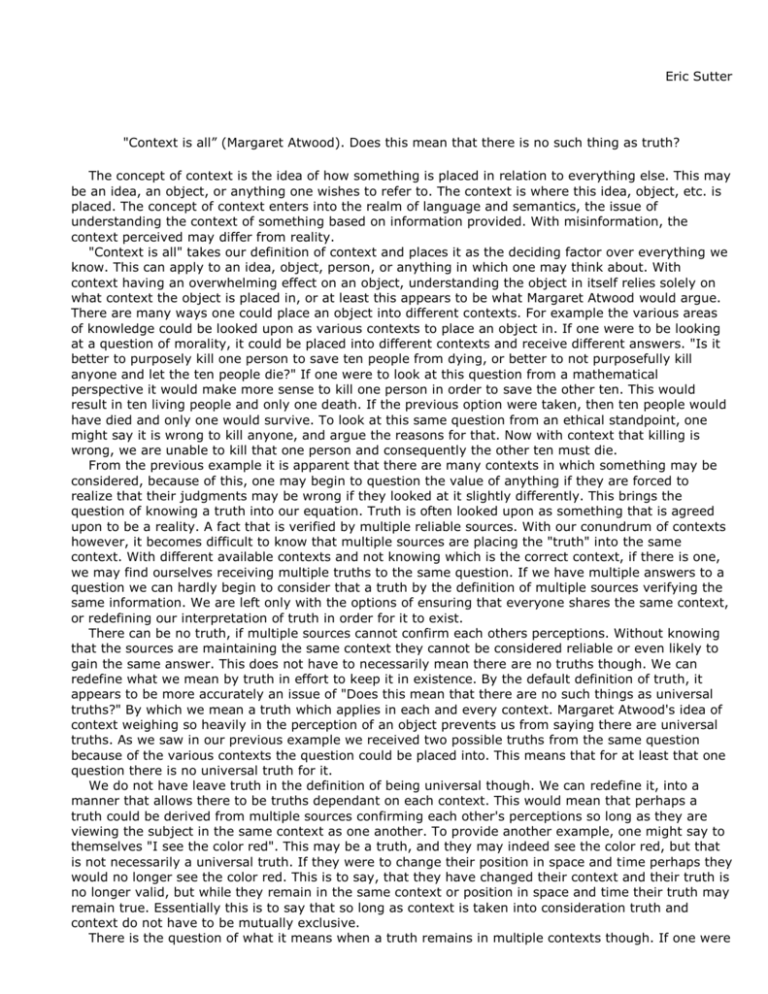
Eric Sutter "Context is all” (Margaret Atwood). Does this mean that there is no such thing as truth? The concept of context is the idea of how something is placed in relation to everything else. This may be an idea, an object, or anything one wishes to refer to. The context is where this idea, object, etc. is placed. The concept of context enters into the realm of language and semantics, the issue of understanding the context of something based on information provided. With misinformation, the context perceived may differ from reality. "Context is all" takes our definition of context and places it as the deciding factor over everything we know. This can apply to an idea, object, person, or anything in which one may think about. With context having an overwhelming effect on an object, understanding the object in itself relies solely on what context the object is placed in, or at least this appears to be what Margaret Atwood would argue. There are many ways one could place an object into different contexts. For example the various areas of knowledge could be looked upon as various contexts to place an object in. If one were to be looking at a question of morality, it could be placed into different contexts and receive different answers. "Is it better to purposely kill one person to save ten people from dying, or better to not purposefully kill anyone and let the ten people die?" If one were to look at this question from a mathematical perspective it would make more sense to kill one person in order to save the other ten. This would result in ten living people and only one death. If the previous option were taken, then ten people would have died and only one would survive. To look at this same question from an ethical standpoint, one might say it is wrong to kill anyone, and argue the reasons for that. Now with context that killing is wrong, we are unable to kill that one person and consequently the other ten must die. From the previous example it is apparent that there are many contexts in which something may be considered, because of this, one may begin to question the value of anything if they are forced to realize that their judgments may be wrong if they looked at it slightly differently. This brings the question of knowing a truth into our equation. Truth is often looked upon as something that is agreed upon to be a reality. A fact that is verified by multiple reliable sources. With our conundrum of contexts however, it becomes difficult to know that multiple sources are placing the "truth" into the same context. With different available contexts and not knowing which is the correct context, if there is one, we may find ourselves receiving multiple truths to the same question. If we have multiple answers to a question we can hardly begin to consider that a truth by the definition of multiple sources verifying the same information. We are left only with the options of ensuring that everyone shares the same context, or redefining our interpretation of truth in order for it to exist. There can be no truth, if multiple sources cannot confirm each others perceptions. Without knowing that the sources are maintaining the same context they cannot be considered reliable or even likely to gain the same answer. This does not have to necessarily mean there are no truths though. We can redefine what we mean by truth in effort to keep it in existence. By the default definition of truth, it appears to be more accurately an issue of "Does this mean that there are no such things as universal truths?" By which we mean a truth which applies in each and every context. Margaret Atwood's idea of context weighing so heavily in the perception of an object prevents us from saying there are universal truths. As we saw in our previous example we received two possible truths from the same question because of the various contexts the question could be placed into. This means that for at least that one question there is no universal truth for it. We do not have leave truth in the definition of being universal though. We can redefine it, into a manner that allows there to be truths dependant on each context. This would mean that perhaps a truth could be derived from multiple sources confirming each other's perceptions so long as they are viewing the subject in the same context as one another. To provide another example, one might say to themselves "I see the color red". This may be a truth, and they may indeed see the color red, but that is not necessarily a universal truth. If they were to change their position in space and time perhaps they would no longer see the color red. This is to say, that they have changed their context and their truth is no longer valid, but while they remain in the same context or position in space and time their truth may remain true. Essentially this is to say that so long as context is taken into consideration truth and context do not have to be mutually exclusive. There is the question of what it means when a truth remains in multiple contexts though. If one were to use the various ways of knowing to acquire a truth and they found themselves reaching the same truth despite the various contexts, what does that mean for the truth? Perhaps the ability for a truth to maintain itself through multiple contexts would lead to a universal truth, or perhaps at least a stronger sort of truth. The depth of context may be deeper than this implies though. To say that one used multiple ways of knowing to acquire a universal truth may not necessarily mean they contexts are all that different. For example, perception, a way of knowing may carry many contexts into which one may perceive something. There may be a deeper series of contexts within perception that may vary between individuals making the universal truth even more difficult to achieve. How does the question affect us in reality though? When we are forced to question truths based on context how does it affect us? With not being able to determine something necessarily a truth in each case, we then have to be open to various answers to the same question based on context. We are forced to use the various ways of knowing and areas of knowledge to acquire our truths in hopes of validity. This method would enable us to keep our concept of truth, while requiring us to alter it at the same time. We can no longer conceive of only one truth for there is not only one context. For each context we may that there may be another truth in it. This unfortunately does make the task of coming to a truth rather arduous as we must look at the countless possible contexts in which it may be perceived and we are forced to adjust our truths as we become aware of next contexts. With this heavy burden though, there is greater ability to understand the variety of answers to many universal questions such as those that exist in religion and philosophy. We can learn the contexts of others and the resulting truths of their context and gain a greater understanding of where the truth we come to lies in context to the others.
